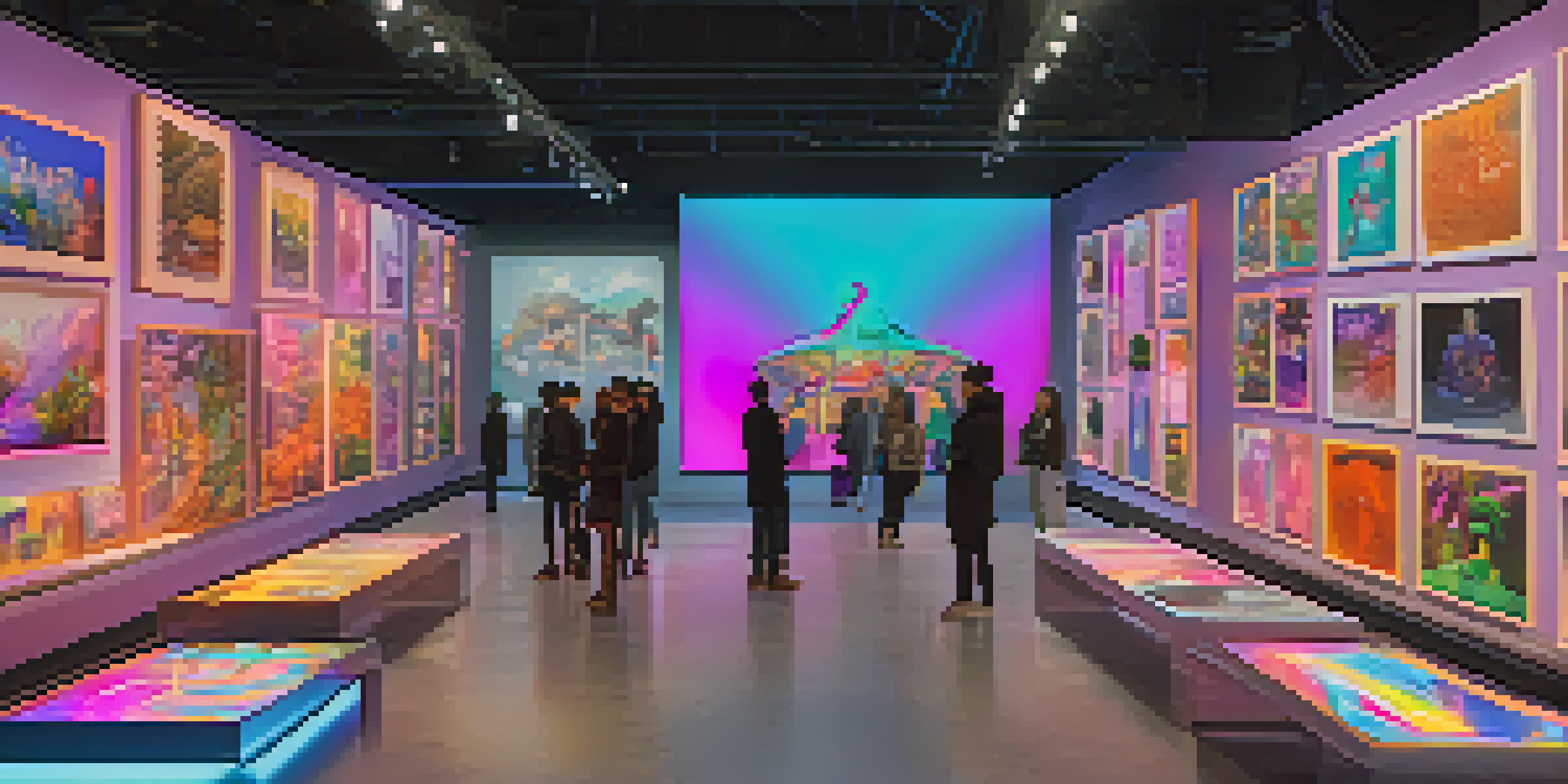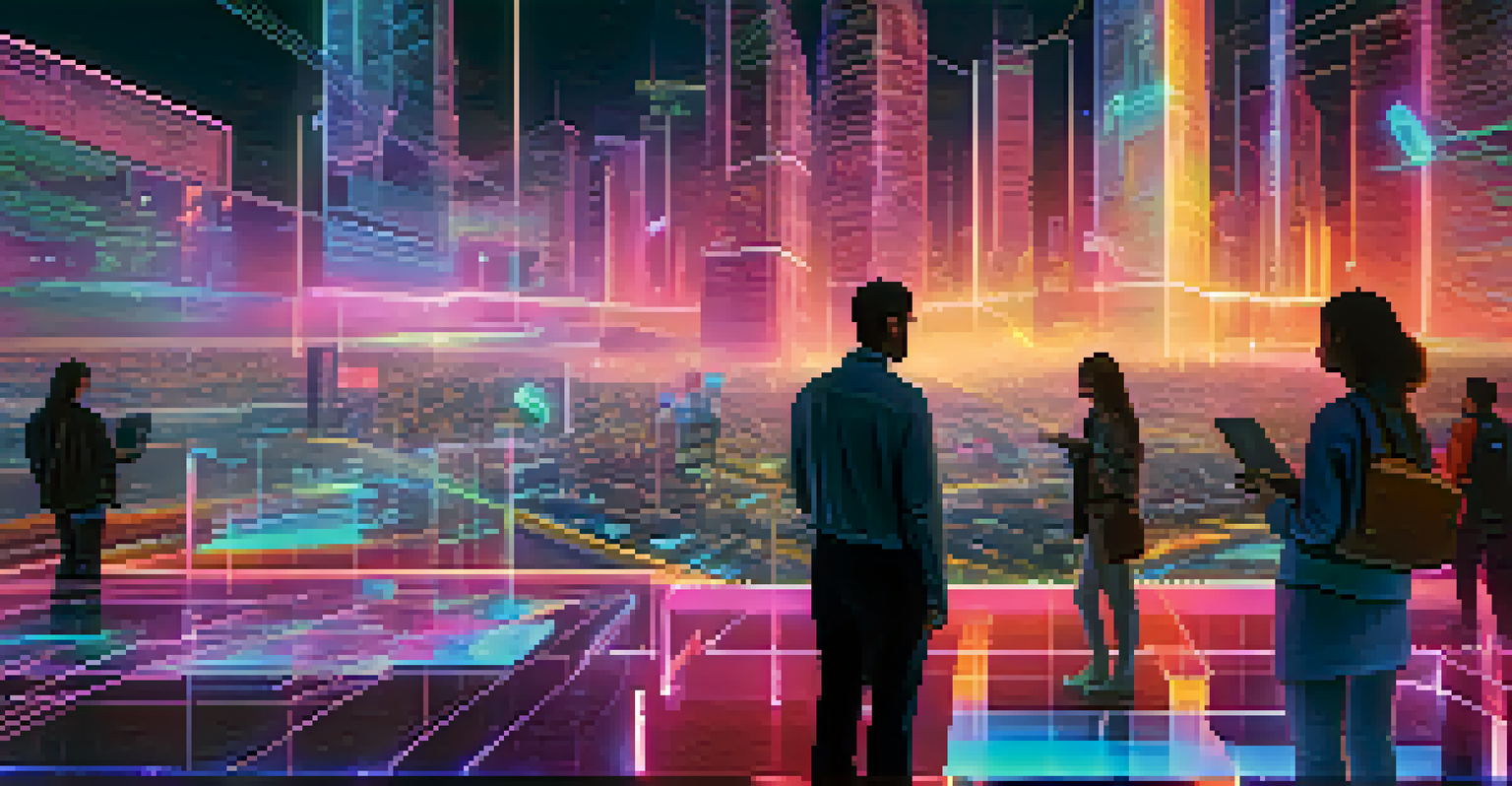Exploring the Basics of NFTs and DAOs: A Comprehensive Guide

Understanding NFTs: What Are Non-Fungible Tokens?
Non-Fungible Tokens, or NFTs, are unique digital assets that represent ownership of a specific item or piece of content, often linked to the blockchain. Unlike cryptocurrencies like Bitcoin, which are interchangeable and have the same value, NFTs are one-of-a-kind. This uniqueness is what makes them appealing to artists, collectors, and creators who want to establish authenticity and provenance for their work.
NFTs are a means of establishing authenticity and provenance in the digital world.
Imagine having a digital painting that no one else can own; it’s like owning an original piece of art rather than a print. This ownership is recorded on the blockchain, making it secure and verifiable. As the digital realm expands, NFTs have found their way into various sectors, from art and music to gaming and virtual real estate, driving a new wave of innovation.
However, the NFT space is not without its challenges. Issues like copyright disputes, environmental concerns related to blockchain energy consumption, and market volatility are important to consider. Understanding these factors helps buyers and creators navigate the NFT landscape more effectively.
The Rise of DAOs: Decentralized Autonomous Organizations
Decentralized Autonomous Organizations, or DAOs, represent a new way of organizing people around shared goals using blockchain technology. Unlike traditional organizations that rely on a centralized authority, DAOs operate through smart contracts on the blockchain, allowing all members to have a say in decision-making. This democratization of control is one of the most exciting aspects of DAOs.

Think of a DAO like a community garden where every member has a voice in what gets planted and how the garden should be maintained. Members vote on proposals, allocate resources, and even manage funds collectively. This collaborative approach empowers individuals and encourages transparency, making it an appealing model for various projects and initiatives.
NFTs: Unique Digital Ownership
NFTs are exclusive digital assets that establish ownership and authenticity, making them appealing across various creative sectors.
Despite their potential, DAOs face their own set of challenges, including governance issues and the need for robust smart contracts to prevent exploitation. As the concept matures, it's crucial for participants to understand how to engage effectively within a DAO and contribute to its success.
How NFTs and DAOs Intersect: A New Frontier
The intersection of NFTs and DAOs is where innovation truly thrives. DAOs can use NFTs as a means of governance, allowing members to hold tokens that represent their voting power. This creates a system where owning an NFT not only signifies ownership of an asset but also grants influence within the organization.
Decentralized Autonomous Organizations represent a new way of organizing people around shared goals using blockchain technology.
For example, a DAO focused on funding digital art projects might require members to hold specific NFTs to vote on which projects receive funding. This integration encourages active participation and aligns the community's interests with the success of the projects being supported. It’s a win-win for creators and supporters alike.
However, navigating this intersection requires a clear understanding of both NFTs and DAOs. Participants should consider how their contributions can shape the direction of the projects they care about and how they can leverage their NFT holdings for greater influence within the DAO.
The Role of Smart Contracts in NFTs and DAOs
Smart contracts are the backbone of both NFTs and DAOs, enabling self-executing agreements between parties without the need for intermediaries. These contracts are coded on blockchain platforms, ensuring that the terms are transparent and immutable. This technology is what allows NFTs to function as unique assets and DAOs to operate as decentralized entities.
Imagine you’re entering a contract to buy a house but without a realtor. A smart contract automatically transfers ownership once the payment is made, ensuring both parties adhere to the agreed terms. In the case of DAOs, smart contracts facilitate voting processes and fund management, making governance efficient and fair.
DAOs: Collective Decision-Making
DAOs enable decentralized governance through smart contracts, allowing members to collaboratively manage resources and make decisions.
While smart contracts simplify many processes, they require careful coding to avoid vulnerabilities. Understanding how they work is crucial for anyone looking to engage seriously in the NFT or DAO space, as even small errors can lead to significant issues or losses.
NFT Marketplaces: Where to Buy and Sell
NFT marketplaces are platforms where users can buy, sell, and trade NFTs. Some of the most popular marketplaces include OpenSea, Rarible, and Foundation, each offering unique features and types of NFTs. These platforms serve as the digital storefronts for artists, musicians, and creators to showcase their work to potential buyers.
Navigating these marketplaces can feel overwhelming at first, but they generally provide user-friendly interfaces that make buying and selling straightforward. Think of it as browsing an online store where you can filter by categories, search for specific items, and even view the history of sales for each NFT to gauge its value.
However, it’s essential to do your research before diving in. Each marketplace has its own fees, rules, and community standards, so understanding these nuances can help you make informed decisions. By choosing the right platform, you can enhance your experience in the growing NFT ecosystem.
Challenges in the NFT and DAO Space
While NFTs and DAOs present exciting opportunities, they also come with their share of challenges. For NFTs, issues such as copyright infringement, market speculation, and the environmental impact of blockchain technology are pressing concerns that need addressing. Artists and buyers alike must navigate this complex landscape to protect their interests.
DAOs, on the other hand, face governance challenges, including decision-making dynamics and potential manipulation by holders of large amounts of tokens. The very nature of decentralization can sometimes lead to confusion about accountability and responsibility, making it vital for members to establish clear guidelines and protocols.
Challenges and Future Trends
Both NFTs and DAOs face challenges like market volatility and governance issues, but their potential for innovation continues to grow.
Addressing these challenges requires collaboration and education within the community. Engaging in open discussions and sharing best practices can help mitigate risks and foster a healthier environment for innovation and growth.
The Future of NFTs and DAOs: Trends to Watch
The future of NFTs and DAOs is shaping up to be incredibly dynamic. As technology evolves, we can expect to see more innovative use cases for NFTs, from tokenized real estate to virtual reality experiences. This expansion will likely draw in a wider audience, making digital assets more mainstream.
DAOs are also poised for growth, with many organizations exploring how decentralized governance can enhance their operations. As more people recognize the benefits of community-driven decision-making, the potential applications for DAOs will continue to expand across various sectors.

Keeping an eye on these trends is essential for anyone interested in the digital asset space. By staying informed and engaged, you can position yourself to take advantage of the opportunities that arise as NFTs and DAOs continue to evolve.